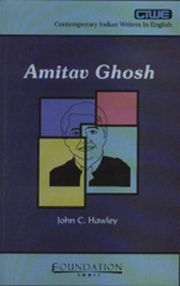Book contents
- Frontmatter
- Contents
- Series Editor's Preface
- 1 The Writer, his Contexts and his Themes
- 2 A Writer Situated in a History and in a Place: Ghosh's Non-fiction
- 3 A Tale of Two Riots: The Circle of Reason and The Shadow Lines
- 4 The Ebb and Flow of Peoples across Continents and Generations: In An Antique Land, The Glass Palace, The Hungry Tide
- 5 Subaltern Agency as Fiction or Science: The Calcutta Chromosome
- 6 Beyond the Commonwealth: Amitav Ghosh and Indian Writing in English
- Topics for Discussion
- Bibliography
6 - Beyond the Commonwealth: Amitav Ghosh and Indian Writing in English
Published online by Cambridge University Press: 26 October 2011
- Frontmatter
- Contents
- Series Editor's Preface
- 1 The Writer, his Contexts and his Themes
- 2 A Writer Situated in a History and in a Place: Ghosh's Non-fiction
- 3 A Tale of Two Riots: The Circle of Reason and The Shadow Lines
- 4 The Ebb and Flow of Peoples across Continents and Generations: In An Antique Land, The Glass Palace, The Hungry Tide
- 5 Subaltern Agency as Fiction or Science: The Calcutta Chromosome
- 6 Beyond the Commonwealth: Amitav Ghosh and Indian Writing in English
- Topics for Discussion
- Bibliography
Summary
Weaving is Reason, which makes the world mad and makes it human.… it is a technique for laying a cross-thread … between parallel long threads…, so that they lock the weft in place.
(The Circle of Reason, 58, 74)It is when we think of the world the aesthetic of indifference might bring into being that we recognize the urgency of remembering the stories we have not written
(“The Ghosts of Mrs. Gandhi,” The Imam and the Indian: 62).If the first quote reminds us of the joy Amitav Ghosh takes in telling his interlocking stories; the second striking quote underscores the sense of vocation that he brings to the task. We must note, first of all, that writing is a career he chose after, or in the course of, an academic career as a trained anthropologist with a doctorate from a good school. If his novels and essays show strong evidence of that anthropological training – in their careful observation of their characters, surroundings, and history; their implied comparative sweep of cultures and eras; their implied philosophical investigation of what it means to be a human being – they just as strongly show the novelist's delight in narrative, in character development, in themes and symbols and the other stylistic devices that might seem extraneous to strict academic investigation. In short, Ghosh ties his wagon to imagination, and especially to stories. The second quote, though, forcefully suggests that he retains the anthropologist's dedication to “remembering” stories that otherwise slip from consciousness and from recorded history.
- Type
- Chapter
- Information
- Amitav GhoshAn Introduction, pp. 164 - 177Publisher: Foundation BooksPrint publication year: 2005

